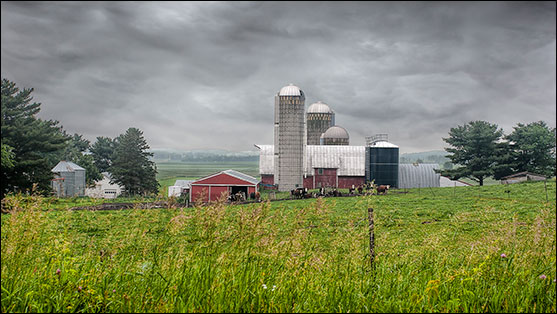
What can you see from your back porch?
I used to think my grandfather's worldview was limited and small-minded.
This quiet farmer was known for saying, “I can see the whole world from my back porch.” Such was the limited worldview of my grandfather the yokel, the hayseed, the small-minded man stuck in a rut—or so I used to think.
Peter shook his head in disbelief at my parents’ decision to begin their lives together by striking out for the wilds of Alaska. My parents felt compelled to seek their fortunes in the wide world. They left far behind the rooted life of the dairy farm and the limited view from the back porch.
During the first fourteen years of my life, we divided our time between Alaska and Wisconsin. For half of the year my parents taught in village schools on Kodiak Island, and during the other half we lived on a fruit farm near Mineral Point, Wisconsin. A life with this routine gave me a sense of uniqueness. I was not like my friends who were “just” rural Wisconsinites or “just” Alaskan villagers. My possibilities were more expansive.
In my graduation speech at Mineral Point High School, I told my classmates that this was the moment to take off their metaphorical sunglasses, which represented the protective bubble of small-town Wisconsin. I urged them to really experience the brightness of the world, even if it was a little overwhelming and scary at first.
I did my best to lead the way. I enrolled in Wisconsin’s most cosmopolitan university in Madison and chose to study geography, a globetrotting discipline if ever there was one. My studies took my mind to every corner of the planet, and my body did its best to follow.
When I began teaching, I led trips to expand the horizons of my geography students. We went to places like Costa Rica, where they could—as George Bailey put it in It’s a Wonderful Life—shake off the dust of their crummy little hometowns and see the world!
On my first trip to Costa Rica, our group ended up staying at Finca Pasiflora, a little organic family farm nestled into the forest. After we returned, one of the participants gushed that she learned more during the eight days of our trip than in all the college courses she had taken before, combined. Her fellow travelers nodded in agreement.
These sentiments excited me, but also left me perplexed. How could these young folks learn more in a week of working, playing, exploring, and talking with each other on a farm than they had studying for many semesters in libraries and classrooms, including my own?
“What have you learned?” I asked, and they replied, “We’ve learned . . .
“. . . to attend to little things—the texture of each rock, the smell of ripe fruit, the routines of insects, and shifts in the wind.
“. . . to live in a community, sharing in triumphs and struggles of the day’s work.
“. . . to solve problems creatively with the tools on hand.
“. . . to feel the pulse of the earth—waking up and going to bed with the sun, working when it is dry, and resting in the rain.
“. . . to celebrate plantings and births as well as harvests, knowing that we are all intimately connected to the cycle of life and death.
“. . . to see that a life spent tilling the soil is noble and dignified. It is a life that we wish we were brave enough to build for ourselves.”
Slowly, I learn these things as well, a little more every time.
And so we return to my grandfather, Peter, whose life embodied these Costa Rican epiphanies. Peter the quiet farmer who seemed to know these things without trotting the globe, without spending an extra dime. Peter, my wise grandfather, who could see all these deep truths, I now believe, from his back porch.
May your travels help you see with such eyes.
This article appeared in the Winter 2014 issue of UU World (page 16). Photograph (above): Wisconsin Farm (cc Randen Pederson). See sidebar for links to related resources.
Comments powered by Disqus






